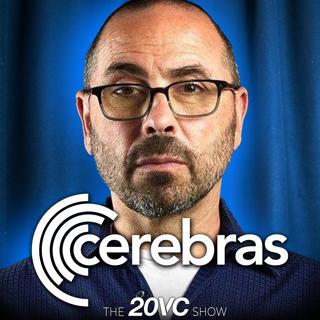
20VC Will Seed Pricing Remain High | Where is the Funding Crunch? | Three Core Elements Required to Raise a Series B/C | Why AI is Like the Lottery Today | Why Now is the Best Time to be Investing in Crypto | Why Investors Do Not Want to Reprice Companies
Rebecca Kaden is a Managing Partner @ Union Square Ventures, one of the leading early-stage firms of the last decade with investments in Twitter, Twilio, Coinbase and many more. Nicole Quinn is a General Partner @ Lightspeed where she has led investments or sits on the board of Calm, Cameo and LunchClub to name a few. Eurie Kim is a Managing Partner @ Forerunner Ventures, the leading early-stage consumer fund. Eurie has led investments and sits on the board of Oura, The Farmers Dog, Curology and more. In Today's Roundtable We Discuss: 1. Seed Rounds: Is it even possible for traditional seed funds to play in a world of multi-stage funds investing so aggressively at the seed stage? Is seed immune to the macro environment? Will seed pricing remain as high as ever? What advice does the team have for seed founders approaching a Series A? What do they need? 2. Series A: How is the Series A market looking today? Is there a crunch at the Series A? To what extent are valuations compressed at the Series A? What 3 core elements do companies at the A stage, looking for a Series B next, need to focus on? 3. Series B and Beyond: Is the real crunch at the Series B? Why are down rounds so much better than structured rounds for companies raising? Will we see a wave of M&A in the next 12 months? 4. Crypto, AI and Hot Takes: Why is now the best time to be investing in crypto? Why is investing in AI a lottery right now? What is the most controversial thing that each believes today?
17 Nov 202340min
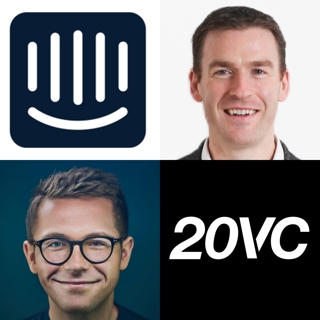
20VC: How to Survive and Thrive in a World of OpenAI, Are LLMs Being Commoditised, Where Does the Value Lie; Infrastructure or Application Layer, How Apple Could Win in a World of AI, How Amazon Could Threaten OpenAI and Why Google Struggle with Des Trayn
Des Traynor is a Co-Founder of Intercom, and has built and led many teams within the company, including Product, Marketing, and Customer Support. Today Des leads all Intercom's R&D efforts, and parts of Intercom's marketing. In Today's Episode with Des We Discuss: 1. From Consultancy to Founding a Unicorn: What was the founding a-ha moment for Des and the team with Intercom? Why does Des believe that most startup advice is BS and outdated in 5 years? What does Des know now that he wishes he had known when he started? 2. LLMs: The World is Not Equal: What does Des mean when he says the world of LLMs is not equal? How do the different LLMs very in quality, price and speciality? Does Des agree with Alex @ Nabla, "the best companies in the future will work with many LLMs at the same time and switch between them for different things"? To what extent does Des believe LLMs will be commoditised and it will be a race to the bottom? Would Des be a buyer of OpenAI at a $90BN price? Why not? 3. How to Survive in a World of OpenAI: What two simple questions will determine if Open AI will kill your existing business? What 3 criteria will determine if there is a new business to be built on top of OpenAI? What is the different between a thin layer on top of an LLM and a thick wrapper with real value? Which traditional incumbents are most vulnerable? What should they do in this new world? How long does it take for incumbents to really be impacted? 4. The Titans of Tech: Who Wins: Why does Des believe that Apple could be a massive winner in the next wave of AI? Why does Des believe that Google have not been impressive and failed to keep pace? Why does Des think OpenAI should be wary of Amazon? What could they do to threaten them? What opportunity does Facebook have here? How could Instagram and Whatsapp win? 5. Startup and Investing 101: Why does Des believe that every founder should write a blog post per week? Why does Des believe that most B2B marketing sucks? What makes great B2B marketing? What are Des' biggest lessons from the Hopin journey? How has Des' angel investing changed in the last year with the rise of AI?
15 Nov 20231h 18min
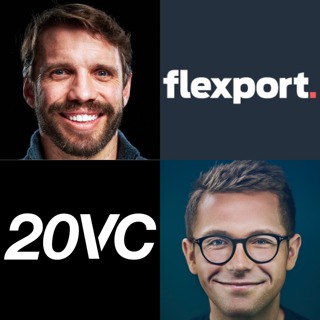
20VC: Flexport's Ryan Petersen: Reflections on Leadership from 13 Years Leading Flexport, Why Velocity not Speed is Most Important in Company Building, How Money Creates Inefficiencies in Scaling, The Future of Trade with China & Why Remote Work is so Cha
Ryan Petersen is Founder & CEO @ Flexport, a leader in global supply chain technology. In 2022, Flexport moved more than $26 billion of merchandise. Over the last 10 years, Ryan has raised close to $2.5BN for the business with the latest valuation pegging the business at $8BN. Prior to starting Flexport, Ryan was the founder and CEO of ImportGenius, a premier provider of transaction data for the global trade industry. In Today's Episode with Ryan Petersen We Discuss: 1. The Origins of a Generational Defining Leader: What did Ryan want to be when he was growing up? How did scooters and motorbikes in China lead to the idea for Flexport? What does Ryan know now that he wishes he had known when he started Flexport? 2. Speed and Money: The Secrets To Execution: Does Ryan believe speed is key to execution? What is the difference between speed and velocity? What advice does Ryan have to founders who raise a lot of money? How should it impact hiring? What are the most common ways founders become inefficient post-fundraising? Why does Ryan look to invest in founders with jaded pasts and a chip on their shoulder? 3. The Art of Resource Allocation: Are the best CEOs the best resource allocators? What is the single best resource allocation Ryan has made? What did he learn? What is the worst? What did he learn? What have been Ryan's biggest hiring mistakes? How did that change his approach? 4. The Wider World: Is Ryan long or short on China? Why? Will we see global trade become nationalized? Why? Will we see interest rates raised further? What impact does that have on trade? What has been the impact of war on trade and the shipping industry? 5. Ryan Petersen: The Father and Husband: How has having kids changed how Ryan approaches leadership and management? How does Ryan juggle 2 young kids and leading a 2,500 person company? How does Ryan retain romance with his wife while also being a full-on CEO of a large co? Does money make you happy? What does it help with? What does it not help with?
13 Nov 202357min
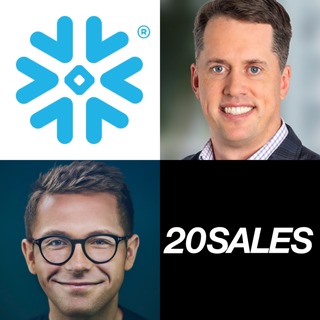
20Sales: Five Lessons Scaling Snowflake to $1BN ARR, Why Customer Success is BS and Should Be Removed, Why All Sales Reps Should Do Eight Calls Per Week & Why You Should Hire a Head of Sales Sooner Than You Think with Chris Degnan, CRO @ Snowflake
Chris Degnan serves as Snowflake's Chief Revenue Officer and has been with the company since 2013. Starting as employee #13 and Sales employee #1, Chris built a go-to-market strategy from the ground up, driving sustained high growth and global reach. Under his sales leadership, Snowflake has grown its annual product revenue from $0 to over $1 billion. Prior to Snowflake, Chris served in Sales leadership roles at EMC and Aveksa, and worked in enterprise sales at Informatica and Covalent Technologies (acquired by VMware). In Today's Episode with Chris Degnen We Discuss: 1. From SDR To World Leading CRO: How did Chris first make his way into the world of sales? What does he know now that he wishes he had known when he started in sales? What are the single biggest mistakes young sales people make today scaling their careers? 2. The Secret to Hitting Quota in Sales: Why does Chris believe all reps need to do 8 customer calls per week? How do the best sales reps approach sales prospecting today? Is cold outbound dead? How does Chris advise his teams on cold calls and emails? What are the best reasons reps should say no to customers? Should reps be discounting today? What is an acceptable level? 3. Sales and Product: The Most Important Relationship: Why does Chris believe sales and product is the most important relationship? What can leaders do to ensure sales and product communicate effectively? How does Chris use sales calls today both with his sales team and with product? What are the single biggest reasons comms between sales and product breaks? 4. Mastering Sales Leadership: How does Chris approach sales forecasting? What works? What does not work? Does Chris celebrate when quota is hit? How do you find the balance between pushing further and harder but also celebrating the wins? How do the best sales leaders train and develop their talent? What do the worst do? 5. Customer Success is BS: Professional Services for the Win: Why does Chris believe that customer succeed is BS and you should get rid of it? Why are professional services so much better? How should the org be structured then when removing CS and adding professional services? Who is then responsible for upsell?
10 Nov 202357min
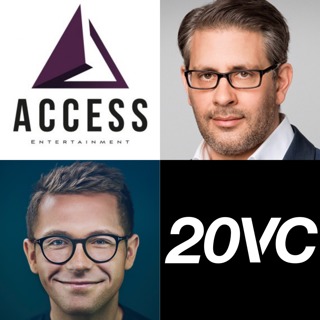
20VC: From Leading the BBC to Leading Venture Capitalist, The Biggest Similarities and Differences Between the Best Founders and the Best Actors & The Future of Media; Legacy vs New, The Creator Economy, The Rise of TikTok and more with Danny Cohen
Danny Cohen is the President of Access Entertainment, a division of Len Blavatnik's Access Industries. Access Entertainment's corporate investments include film and television studio A24; Europe's fastest-growing company Tripledot Studios; creator economy leader Spotter; and a new immersive arts' experience launched in collaboration with David Hockney and Lightroom. Before joining Access, Danny was the Director of BBC Television where he had responsibility for all of the BBC's network channels and the greenlighting and production of the BBC's drama, entertainment, comedy, arts, history, science, educational content and documentary. In Today's Episode with Danny Cohen We Discuss: 1. From Leading the BBC to Investing for Len Blavatnik: How did Danny make his way from leading the BBC to investing for Len @ Access? What was he most nervous about when making the transition to investing? What has been the hardest investing skill to learn? 2. Great Founders are Like Great Actors: What are the biggest similarities in what makes the best founders and the best actors? How are the best founders different from the best actors? Why does Danny believe the risk that an actor takes is so different to the risk founders take? How does Danny feel both founders and actors can and should be managed? 3. The Future of Media: What does Danny mean when he says he looks for "eyeballs and attention" when investing? How does legacy media respond to the threat created by social media today? How does AI change the future of content creation and distribution today? How do the strikes in Hollywood impact the future of content supply? 4. Marriage, Children and Loneliness: Why does Danny believe that loneliness will continue to be the biggest problem we face? What are Danny's biggest pieces of advice from 17 years of happy marriage? Why did Danny decide to not have children? What did that decision-making process look like?
8 Nov 202350min
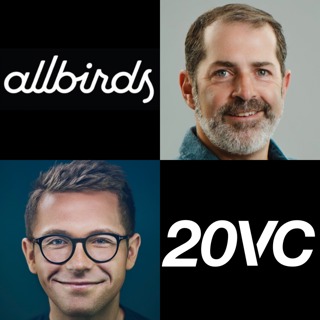
20VC: From $4.1BN to $142M Market Cap; Why Public Markets Have Written Allbirds Off, What Allbirds Need to Do to Get Profitable, Why Growth has Slowed and The Bull Case for Allbirds Next Five Years with Joey Zwillinger, Co-Founder @ Allbirds
Joey Zwillinger is the Co-Founder & CEO @ Allbirds, the company behind the world's most comfortable shoe. In Nov 2021, Joey took the company public and the stock soared to an all-time high of $4BN, today the company has a market cap of $137M. Prior to Allbirds, Joey spent six years at biotechnology firm, Terravia, leading its renewable chemical business, developing and selling high-performance algae-based chemicals into various industries such as CPG, personal care, and industrials. In Today's Episode with Joey Zwillinger We Discuss: The Founding Moment: How did Joey's wife's friendship lead to the co-founding of Allbirds? What does Joey know now that he wishes he had known at the founding moment? What does Joey believe he is running away from? What is he running towards? 2. Public Market Performance Review: Why has Allbirds lost 97% of it's value since going public? What mistakes were made? Why has revenue declined for the first time this year? What strategic investments have Allbirds pulled back on or paused entirely? When will Allbirds be profitable? 3. The Competition: How do Allbirds compete and catch up with On and Hoka? What strategic mistakes did Allbirds make in COVID that allowed others to take the crown? Was the movement into running and athletics a mistake for Allbirds? 4. Joey Zwillinger: The Leader and Person: Did Joey take secondaries out during the Allbirds journey? How does Joey reflect on his own relationship to money? How has Joey dealt with the last 12 months personally? How does he manage the stress effectively?
6 Nov 202344min
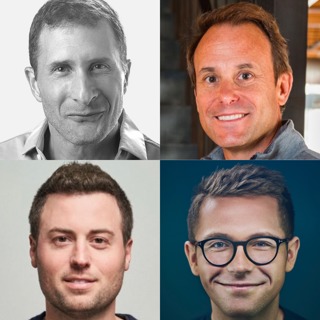
20VC Roundtable: Why Early Stage Founders Should Not be Investing, Why Great Founders Have Low EQ, How the Structure of VC Firms Will Change, Will Founder-Led Funds Compete with Sequoia & Is Investing a Team Sport?
Jack Altman is the Founder and CEO @ Lattice, the #1 people management platform, last valued at $3BN. Jack is an investor through his founding of Jack Altman Capital where he has invested in WorkOS, NexHealth, Owner.com, Mercury and more. Auren Hoffman is the Founder and CEO @ Safegraph, the most accurate database of global points of interest, last valued at $550M. Auren is an investor through his founding of Flex Capital where he has invested in Chime, Checkr, Coinbase, Flexport, Vercel and more. Jason Lemkin is the Founder and CEO @ SaaStr, the world's largest SaaS community. Jason is an investor through his founding of The SaaStr Fund. In the past, Jason has invested in Pipedrive, Algolia, Salesloft, Front, GreenHouse, Owner.com, Gorgias and more. In Today's Episode on Founder-Led Funds We Discuss: Why have we seen the rise of "Founder-led Funds"? Are founder-led funds more empathetic to the founders they invest in? How do founder-led funds source and pick investments in a way that traditional VC does not? Will we see founder-led Funds truly compete against the Sequoias of the world? How does being an operator make you a better investor? How does investing help you be a better founder and operator? How do you communicate your investing practice and firm to your company and team? What are the biggest excitements and concerns LPs have for Founder-led Funds? Will we see the face of venture changing much more broadly and structurally? How do founder-led funds manage both time and company conflicts?
3 Nov 202349min
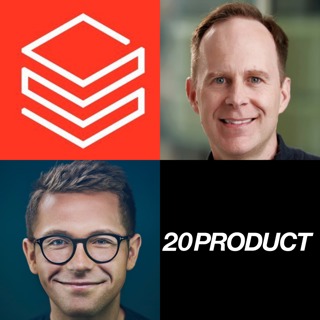
20Product: Why You Should Not Go Into Product Management, Why the CEO is Always the CPO, How to Build the Best Product Teams & Why You Should Hire People Who Aren't In Product Already with Databricks SVP Product, David Meyer
David Meyer is the SVP Products at Databricks where he drives product strategy and execution. He previously ran Engineering and Product Management at OneLogin, where he grew the company to thousands of customers and market leadership. Before OneLogin, he cofounded UniversityNow, an accredited open university system, running Product and Engineering. Prior to that, David managed a $1 billion portfolio of business intelligence products at SAP and co-led cloud strategy. His first software journey was at Plumtree which went public before being acquired by BEA in 2005. In Today's Episode with David Meyer We Discuss: Entry into Product: How did David make his way into the world of product? Why did he not want to go into it? Why does David advise everyone "do not go into product management"? What does David know now that he wishes he had known when he entered product? 2. How to be a Great Product Leader: Why does David think most leaders suck at leading? Why is the most important thing to make your team feel seen? What can leaders do to ensure this? Why does David help his team members to find other roles outside of the company? 3. Building the Best Product Team: How does David hire for product today? What questions does he ask? What signals does he look for? What are David's biggest hiring mistakes? How did they change his approach? What are the biggest mistakes founders make when hiring for product? Why should you hire people who are not in product today? 4. David Meyer: The Art or Science of Product: Is product more art or science? If David were to put a number on it, what would it be? Is simple always better when it comes to product? Will AI remove the importance and focus on UI? Why are the most impressive companies business model innovations not product innovations?
1 Nov 20231h 2min
